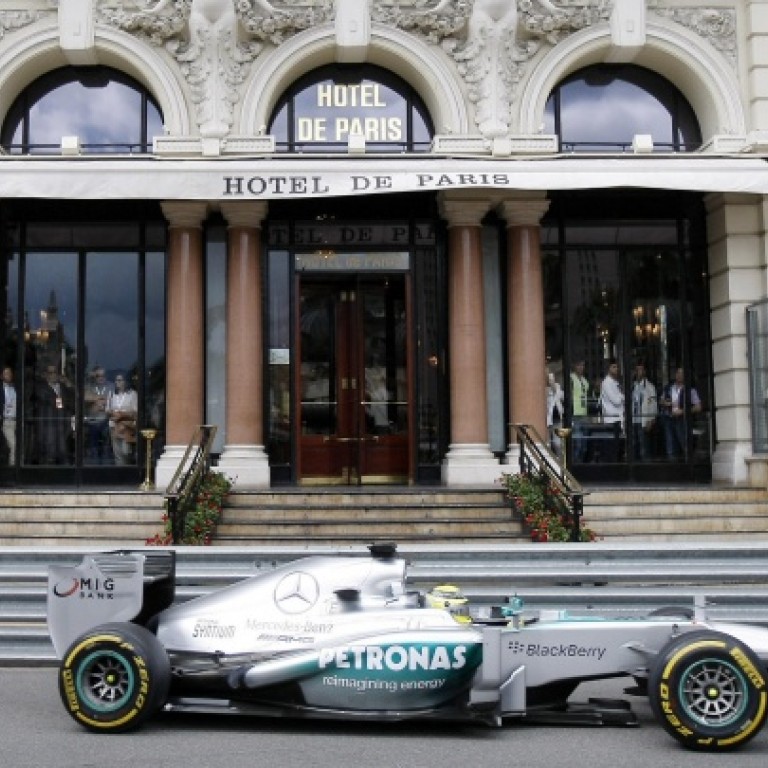
F1 engine ruling a formula for disaster, says Force India
Smaller teams may not survive as new power units drive up costs next season, say Force India, while Rosberg grabs Monaco pole
Some Formula One teams face a fight for survival next season when engine costs more than double, Force India deputy principal Bob Fernley said yesterday.
"You shouldn't underestimate the resolve of Formula One teams, they are incredibly resilient and probably will come through," the Briton said in an interview at the Monaco Grand Prix, hours before Nico Rosberg claimed pole position for today's race in his Mercedes, ahead of teammate Lewis Hamilton and the Red Bulls of Sebastian Vettel and Mark Webber.
"But to add to the level of costs to the teams at this time in an economic cycle, one has to question whether they can all survive," Fernley said.
Formula One is introducing a new 1.6-litre V-6 turbocharged unit with energy-recovery systems in 2014 to replace the existing 2.4-litre V-8.
Under a now-lapsed Resource Restriction Agreement among teams, the V-8 was priced at around €9 million (HK$90.3 million) a season. The new engine will cost more than €20 million.
In-season testing could also be reintroduced next year and teams face an increase in entry fees.
McLaren team principal Martin Whitmarsh said the teams must also shoulder some of the blame. "F1 badly mismanaged the cost of the development and supply of those new power plants," newspaper quoted him as saying.
"We allowed the engineers to be unfettered in dreaming up the regulations, which means teams are now facing big bills."
Fernley said champions Red Bull, Ferrari, Mercedes and McLaren would get a bigger share of revenues under a deal with Bernie Ecclestone, who represents commercial rights holder CVC, but that was of no help to those down the pecking order.
"How much money is being put into the sport and how much money is being taken out of the sport?" asked Fernley, whose team is owned by Indian liquor tycoon Vijay Mallya and the Sahara Group.
Both Mallya and Sahara have been regularly in the financial headlines with the former's Kingfisher airline grounded by debts of US$2.5 billion.
Unlisted Sahara has been ordered by the Indian Supreme Court to repay billions of dollars it raised from millions of small investors.
Mallya insists the team is separate from his business empire as a privately owned entity.
Fernley said: "CVC have got an agenda as bankers to make as much money out of their investment as they possibly can, and that involves minimal investment. And that is not in the sport's interests.
"It's the worst combination that you can have.
"I only question the logic of it. Are we actually trying to stack it in a way that is to get rid of teams, so they can bring customer teams in maybe?"
CVC could not be contacted immediately for comment.
Ecclestone recently revived talk of top teams being able to provide others with cars, something that Ferrari president Luca di Montezemolo has long been pushing for and others such as Frank Williams are firmly opposed to.
Fernley said Force India were in the Williams camp.
"It's not just Frank. Once you bring in 'customer teams' you've lost the identity of Formula One. And you as a team have lost your identity. So you're now just an appendage," he declared.
"There are four teams that have been given special privilege, and those four teams would be the ones that are likely to supply the customer teams. So everything is now moving in the way of the four teams."
The confidential Concorde Agreement that has governed the sport expired at the end of last year and a new one is still being pored over by lawyers with no indication that any signing is imminent.
Ten of the 11 teams - tail-enders Marussia being the exception - have signed individual agreements with Ecclestone that will lapse once a new Concorde Agreement is signed.
However, the governing International Automobile Federation (FIA) has yet to agree to anything.

